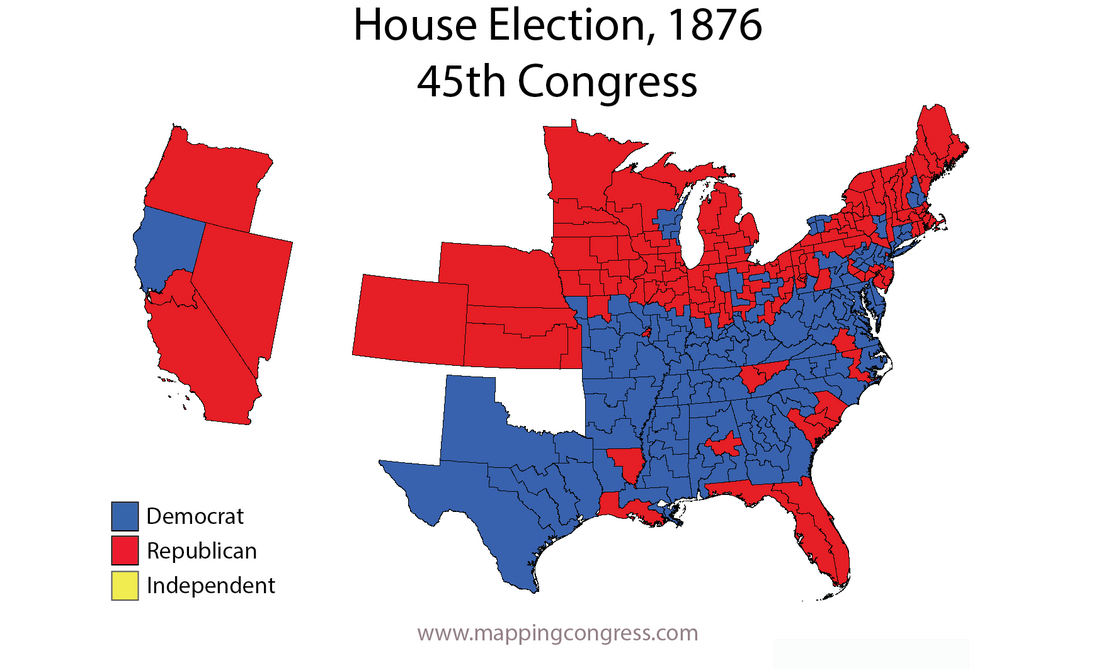Top Qs
Timeline
Chat
Perspective
1876–77 United States House of Representatives elections
House elections for the 45th U.S. Congress From Wikipedia, the free encyclopedia
Remove ads
The 1876–77 United States House of Representatives elections were held on various dates in various states between June 5, 1876, and March 13, 1877. Each state set its own date for its elections to the House of Representatives before the first session of the 45th United States Congress convened on October 15, 1877. The size of the House increased to 293 seats with the addition of the new state of Colorado.
Remove ads
These elections coincided with the (heavily contested) election of President Rutherford B. Hayes and the United States Centennial. Hayes' Republican Party was able to recover from the Democratic Party many of the seats it had lost two years before as the economy improved slightly. However, the Democrats retained a majority and were able to use the disinterest of the people in Republican Reconstruction led projects to help keep crucial seats. Republican congressional leadership had a difficult time distancing itself from the corruption of the Ulysses S. Grant administration or the legislature's impact on the economy downturn.
Remove ads
Election summaries
Summarize
Perspective
| 157 | 136 |
| Democratic | Republican |
The previous election included 4 Independents, in Illinois and Massachusetts.

Remove ads
Election dates
In 1845, Congress passed a law providing for a uniform nationwide date for choosing Presidential electors.[2] This law did not affect election dates for Congress, which remained within the jurisdiction of State governments, but over time, the states moved their congressional elections to this date as well. In 1876–77, there were still 8 states with earlier election dates, and 1 state with a later election date.
Elections before Election Day (United States):
- June 5: Oregon
- September 5: Vermont
- September 11: Maine
- October 4:Georgia
- October 10: Indiana, Iowa, Ohio, West Virginia
Standard Election Day:
- November 7, 1876
Election after Election Day:
- March 13, 1877: New Hampshire
Remove ads
Special elections
This section needs expansion. You can help by adding to it. (December 2019) |
Alabama
Summarize
Perspective
Alabama redistricted and eliminated its at-large seats, going from 6 districts and 2 at-large seats to 8 districts. The state also elected a full delegation of Democrats, voting out the two Republicans.
Remove ads
Arkansas
Remove ads
California
Remove ads
Colorado
There were two elections to the new state of Colorado.
44th Congress
45th Congress
Remove ads
Connecticut
Summarize
Perspective
Connecticut had been electing is members late in the cycle, even after the terms had begun. But starting in 1876, the state joined the others in electing its members on the November 7, 1876 Election Day. The delegation remained 3 Democrats and 1 Republican.
Remove ads
Delaware
Florida
Remove ads
Georgia
Illinois
Indiana
Iowa
Kansas
Kentucky
Louisiana
Maine
Maryland
Massachusetts
Michigan
Minnesota
Mississippi
Missouri
Nebraska
Nevada
New Hampshire
New Jersey
New York
North Carolina
Ohio
Oregon
Pennsylvania
Rhode Island
South Carolina
Tennessee
Texas
Vermont
Virginia
West Virginia
Wisconsin
Summarize
Perspective
Wisconsin elected eight members of congress on Election Day, November 7, 1876.[35][36]
Non-voting delegates
See also
Notes
- There is a significant discrepancy for the party totals in the U.S House resulting from the 1874 elections between Dubin (p. 241, who records 150 Democrats, 2 Independent Democrats, and 141 Republicans), and Martis (pp. 130–131). The discrepancy seems to be accounted for by the fact that Dubin's party figures represent the party totals on the first day of the 45th United States Congress, while Martis' figures take into account the results of later contested elections (all of which were decided in favor of the Democratic candidates who challenged the election results).
- Included 1 Independent Democrat.
- Included 3 Independent Republicans.
- Includes 2 Independent Democrats
- Includes 1 Independent Democrat.
- The election in the Florida's 2nd district was extremely close, with initial returns showing a difference between the two candidates of only 3 votes. Finley challenged Bisbee's election and was eventually seated on February 20, 1879.
References
Bibliography
External links
Wikiwand - on
Seamless Wikipedia browsing. On steroids.
Remove ads





